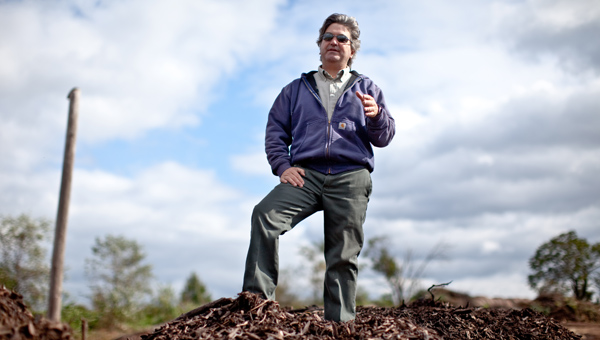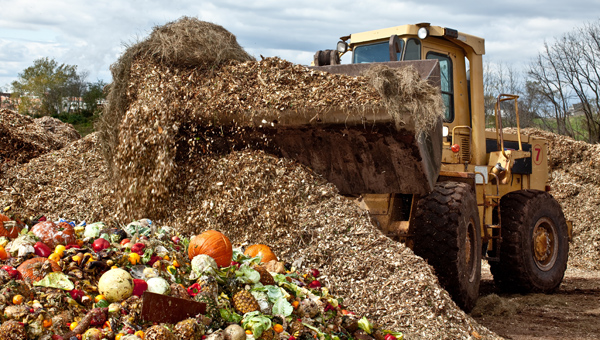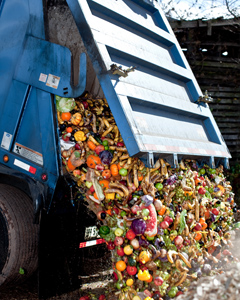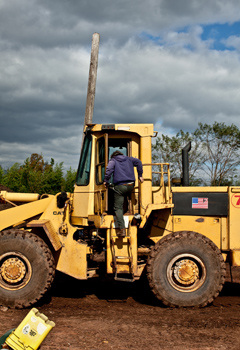 story by liz pacheco | photos by christopher leamanYou could drive past the rusty mailbox and steep muddy driveway of Two Particular Acres, and be totally unaware you had passed a composting facility. There is no smell in the air, no hint of decomposing food, no sign that at the top of the driveway organic waste is being composted by the ton.
story by liz pacheco | photos by christopher leamanYou could drive past the rusty mailbox and steep muddy driveway of Two Particular Acres, and be totally unaware you had passed a composting facility. There is no smell in the air, no hint of decomposing food, no sign that at the top of the driveway organic waste is being composted by the ton.
The commercial composting facility and farm in the Royersford, Pa. suburb receives about 400 to 500 tons of organic waste a year from Philadelphia-area restaurants, supermarkets, hotels and hospitals. They work with well-known businesses like Wawa, Weis Markets and the Four Seasons, turning food scraps into a compost blend coveted by landscapers.
Behind Two Particular Acres is Ned Foley. A once practicing labor lawyer, Foley began as an amateur composter with the simple interest of doing physical labor to keep busy. What he discovered is that turning organic waste into compost isn’t just a viable business, but a chance to alter how Philadelphia handles their food waste.
Foley has envisioned creating a network of smaller composting sites throughout the Philadelphia area. Places like Two Particular Acres, who can handle waste from local businesses in cost effective, time efficient, and odor-free ways.
Even better, Foley’s vision is proving to be both realistic and successful—Philadelphia is composting more commercial waste than ever before.
The method
For his compost business to thrive, Foley knew avoiding odors was essential.
“I’ve got half million dollar homes through these woods right here,” he says, pointing to houses hiding behind trees adjacent to the farm. “The closest one here is only 300 yards away, so I can’t afford to have odors. They could make my life very difficult.”
Foley composts using static aerated piles, a process known to minimize odors. In this method, a specific mixture of organic waste and materials—a recipe Foley says includes elements like rock dust and clay—is piled on perforated pipes. These pipes are connected to a blower that intermittently releases air into the piles. After a few weeks, the piles are moved to dry out and are eventually sifted to remove any large pieces that haven’t decomposed. With an aerated static pile good compost can be made fast and in a small space.
 From lawyer to farmer
From lawyer to farmer
But before the composting business, there was the farm. Foley started farming about 10 years ago as a way to help out his elderly neighbor. Eventually, the owner asked Foley to rent, and then buy, the farm, which produces small grains and hay.
“I started farming, but I didn’t like chemical farming at all,” says Foley, who explains he almost immediately moved to organic farming practices. For Foley, this meant using compost. Although composting on the farm was an easy way to meet this need, he actually began the practice for another reason.
“[The farmer] had been letting landscapers dump wood chips and brush here for years because he wanted the firewood,” says Foley. “There were mountains of this stuff.”
Foley would break the wood into small pieces and spread them out, but they kept accumulating. Armed only with online research and some book knowledge, Foley began to compost the organic waste. When a neighbor knocked on the door asking for some of the finished product, Foley realized he had a larger business opportunity.
 Law-abiding composter
Law-abiding composter
At the time, there was no permit for farms like Foley’s to do composting on-site, so he contacted the Pennsylvania Department of Environmental Protection (DEP). Lucky for him, the DEP was already working on an on-farm composting permit.
“We realized that the large centralized facilities were very expensive to construct and capital-intensive,” says Patti Olenick, the sustainability specialist at Weis Markets who at the time was the organics recycling coordinator with the DEP. “There weren’t a lot of people knocking at the door wanting to do that just because of the investment. Plus, the ones that were in operation tended to have some issues with nuisances, trying to bring in these large volumes to make it profitable.”
Olenick started working with Foley, using Two Particular Acres as the prototype for developing the permit. With the permit and support from the state’s Compost Infrastructure Grant to purchase equipment, Foley developed Two Particular Acres into a full-on composting business.
The rise (and fall) of composting
Since receiving the permit, Foley has gradually become more involved in the compost industry. He began working with the DEP, speaking at conferences and meetings, and consulting with farmers implementing the permit. Foley also teaches composting classes, and is a certified compost specialist with the Professional Recyclers of Pennsylvania.
Having a background in law doesn’t hurt either. “I do a lot of work with the DEP and EPA, and they still consult with me a lot,” says Foley. “And it’s simply because not only can I run a loader, but I can also read a regulation, write a regulation.”
But for now, the on-farm composting permit hasn’t been as widely received as Foley would like.
“Part of the reason I think [is] this is a dairy state and dairy farmers basically live in their barn,” he says.
“To take on another task [of composting], to spend that much time, is just not something that’s big.”
Olenick adds that the permit’s connection with the government can make it unappealing to farmers.
“I think there has been a hesitation on farmers to become involved with the DEP,” she says. Implementing the permit means working close with the agency and, as Olenick explains, the attitude is often It’s the government—I don’t want them here.
A lack of state funding is only making composting more difficult. The Composting Infrastructure Grant Foley received, which was earmarked for purchasing composting equipment for businesses and nonprofits, has since disappeared, along with all governmental funding for composting. Even those within the DEP who worked on composting have left, either because of retirement or staffing cuts.
“There’s no [composting] champion in the DEP,” says Olenick. “A couple people are trying to pick it up, [but] there’s no one out doing the education and building the relationships anymore.”
 The Foley Vision
The Foley Vision
Although Olenick is no longer with the DEP, she and Foley are still working together on compost. Through her position at Weis Markets, Olenick has enlisted his help in starting a composting pilot program. Composting is something Weis has tried before, says Olenick, so getting Foley involved wasn’t a hard sell. The program is designed to reduce hauling costs by collecting food waste and composting it quickly near the stores. The hope is eventually the compost will return to stores and sold in bulk or bags.
This program at Weis plays into Foley’s larger vision for composting.
“My vision always was if we got 50 farms in and around the… suburbs of Philadelphia, we could handle a tremendous amount of the food waste being generated,” he says. “Because it’s a crime that stuff is going into a landfill.”
Initially, on-farm composting seemed like a great solution and it still may be, but Foley is pursuing another path as well. He’s working on a new permit with the DEP to allow quarries to compost on-site.
As Foley explains, these quarries already have the equipment and the setup to handle truck traffic. Even better, they have a lot of material ideal for composting, like rock dust, something Foley uses at Two Particular Acres.
“I thought, ‘This is perfect.’ I need two two three acres in a quarry—and quarries have hundreds of acres, so I’d pretty much be innocuous in there,” says Foley. “I don’t have to worry about all the zoning issues and everything else…all I have to do is create a new permit.”
Since mining is a separate division within the DEP, the initial challenge was getting all the stakeholders together. Once that happened, the permit planning has gone well.
“We’re actually in the final stages of creating a permit that will allow a quarry operator to also run a food and yard waste compost facility,” says Foley. “I hope to be already building sites around later winter, early spring.”
Working with a construction company, Foley is looking at about 40 sites. And with each site comes huge composting potential.
“What I’m looking at,” says Foley, “is now I can go to a grocery store chain and instead of saying to a local store ‘let me take care of your food waste,’ I can go to the central office and say ‘we’ll handle the waste of your entire chain.’”


